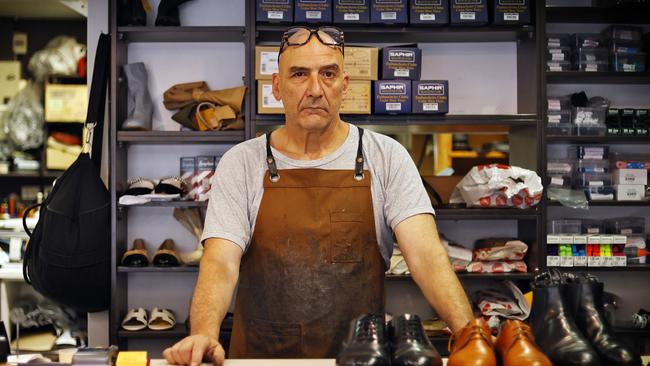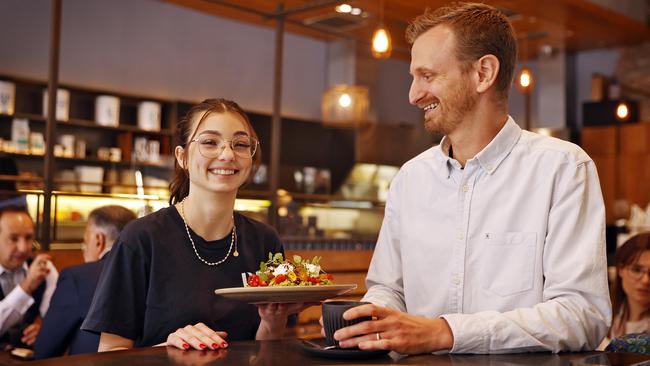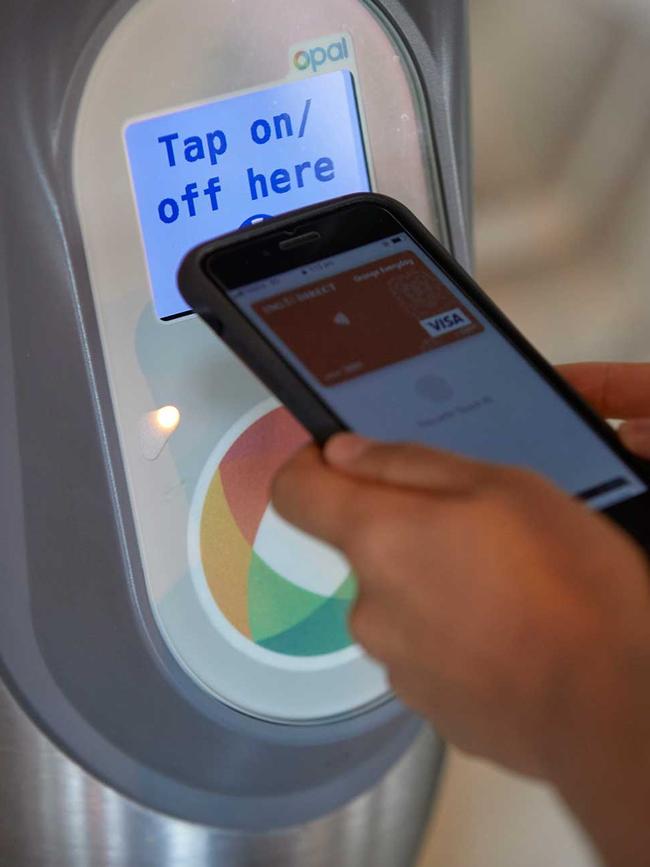Optus fail highlights perils of a cash-free society
This week’s Optus outage highlighted the potential dangers of a cash-free society — but some experts predict it could be a reality in Australia within five years, not that everyone agrees.
NSW
Don't miss out on the headlines from NSW. Followed categories will be added to My News.
Cobbler Robert Atallah gets through four or five coffees a day but he won’t buy any from the popular cafe a few doors down on Castlereagh St in Sydney’s CBD.
Ever since Pablo & Rusty’s Cafe went cash-free in 2017, the proud owner of 60-year-old family business Brice’s Coombs Shoe Services has boycotted his neighbour.
Despite card transactions making up 95 per cent of his trade, Mr Atallah said going cashless would be “morally wrong” and he doesn’t want to support businesses that deprive their customers of the option to use their real-life wallets to pay for things.
“You’ll never get rid of cash, I don’t care what people say,” Mr Atallah said.
“I think ethically and morally it’s not right. I like coffee, I drink coffee four or five times a day and so do my staff, but I’d never go there on that basis.”

The technology fail that saw 10 million Australians lose their Optus services this week brought home to many the dangers of the current trajectory towards a cash-free society — which some experts predict could occur within five years.
While some may rail against it, the reality of a cashless Australia is coming fast, with Macquarie Bank axing cash and cheques from next November and scores of businesses already outright refusing cash.
The latest Reserve Bank of Australia consumer payments survey found cash made up just 16 per cent of in-person transactions.
Economist and Professor of economics at UNSW Richard Holden predicts Australia could become functionally cashless within five years, saying: “(The banks) want us to go cashless, the cost of providing cash is already pretty high.”
Financial regulator APRA found in the 12 months to June 2023, 424 bank branches closed across the country. That’s a loss of 11 per cent of all bank branches.
Many Aussies are leaving their wallet behind entirely as payments move to our phones, with data from the Australian Banking Association showing the use of digital wallets soaring from $746 million in 2018 to $93 billion in 2022.

While the RBA is yet to announce any plans for an official transition to cashless, Prof Holden said while older people and those with privacy concerns may struggle with the change, there’s one group that will hurt the most.
“If you’re a drug dealer or a human trafficker, this is bad news for you,” he said.
“I’ve done done some sort of very rough calculations about this.
“It was probably eight to $10 billion a year in taxes that are being avoided through the cash economy. And that’s eight or $10 billion a year that you and I and everyone else who pays their taxes is chipping in for — we’re paying our fair share and other people aren’t.
“I think that’s part of the sales pitch, which is why are we subsidising these people?”
Professor Holden isn’t alone.
Demographer Simon Kuestenmacher said the technology is “100 per cent there” but cash still has no better alternative when it comes to garage sales, Facebook Marketplace and school fairs.

However, as more and more businesses and banks push us towards leaving cash behind, Mr Kuestenmacher said counter trends have started to emerge.
“If there is a cashless trend you now have all these financial gurus already on TikTok talking about old-fashioned advice on how to use cash to budget,” he said.
“There’s always the common thing which is distrust in the government … the number of transactions where you are actually completely excluding a group is relatively low, we’re talking about people that are unbanked that are completely screwed.”
“Cash stuffing” has become a popular trend online and small businesses have even had success selling personalised cash stuffing wallets.
A small but vocal group of pro-cash Aussies are also making their voices heard online, with groups like Cash Is King and Cash Welcome mobilising boycotts of cashless businesses.
The Optus crash has added fuel to the movement, with supporters pointing to the meltdown as proof we are not ready to abandon cash altogether.
While Australia is an early adopter, we are far from the first country to walk down the cashless road.
Fuelled by worker concerns after a string of robberies, Sweden has become functionally cashless, has launched a mobile payment app for public toilets and is trialling a digital currency.
It’s not all roses for the progressive Swedes, with growing concerns for the elderly and those in regional towns being left behind.
Back in Sydney’s CBD, Chris Tate, the co-owner of Pablo & Rusty’s Cafe, said he had no regrets about becoming an earlier adopter of cashless trading in 2017.
Mr Tate said that, despite a few grumbles from a minority of customers, the move had made their service quicker and, ironically, saved them some cash.
“There’s some downsides with staff handling cash, there’s insurance premiums associated with it – higher insurance costs,” Mr Tate said.
“You’ve got to safely store that money … you’ve got to bank that money at the end of the day, so there’s a cost involved in that in time and labour.”
As a fast-paced CBD cafe, Pablo & Rusty’s is packed out on any given weekday morning, and Mr Tate said by keeping transactions strictly to card, with the majority of those tap and go, the cafe can get takeaway customers in and out as quickly as possible.
“If you can take away all the hassle of cash flow, the awkwardness associated with cash flow, fumbling around to get the right money or change, you can actually enhance the experience for a customer,” Mr Tate said.
It’s a concern shared by National Seniors Australia chief operating officer Chris Grice.
“It’s something that a lot of seniors are reluctant to fully embrace,” he said.
“We would be against it at this point in time, Australia is not ready … we have a fragile system if just one phone and internet carrier can have an outage and we have this system upheaval.”
RBA data shows over-65s and those from low-income households are the most likely to be high cash users.
And while Mr Atallah may have vowed to never turn away cash from his cobbler business, many larger businesses in Sydney have embraced the movement.
Taronga Zoo went cashless during the pandemic, as most businesses were effectively forced to — but it has never gone back.
A spokeswoman said there were still some customers who preferred to pay with cash, and the zoo could “continue to investigate solutions”.
“To accommodate guests who prefer to use cash, Taronga Zoo currently has cashless kiosks on site which allow guests to purchase tickets and load cash onto a wooden card for use across Taronga’s food and beverage and retail outlets,” the spokeswoman said.
Of the many others who had gone cashless, it is notable a “small number” of KFC stores have abandoned cash, a decision the fast food outlet leaves up to franchisees.
Westpac’s Open Air cinemas at Mrs Macquarie’s Point and popular poke bowl chain Fishbowl have also made the switch.
Got a news tip? Email weekendtele@news.com.au




